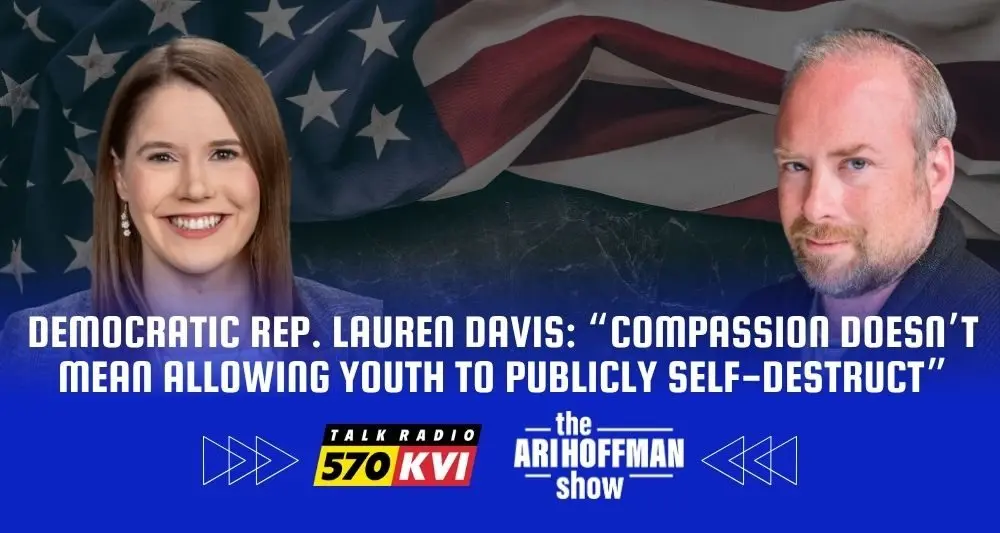
In a rare and powerful act of self-reflection seldom seen in politics, Representative Lauren Davis (D–Shoreline) is publicly acknowledging that Washington’s progressive juvenile justice reforms, many of which she personally supported, have failed. The result, she says, is a growing crisis of youth violence, addiction, and community harm that lawmakers can no longer ignore.
Davis joined The Ari Hoffman Show on Talk Radio 570 KVI to discuss her Seattle Times op-ed, where she detailed how a series of “well-intentioned but disastrous” policy changes have stripped parents, schools, and courts of their ability to intervene before it’s too late.
“I’ve come to the conclusion that we are actually harming these young people and we’re also harming our broader communities,” Davis said. “It’s my duty and obligation as a policymaker to speak out.”
“I Am Culpable”
In her op-ed, Davis wrote candidly about the toll of Washington’s failed juvenile policies, including her own role in advancing them.
“In the past year, I have sat with weeping mothers, constituents of mine, whose children were slain by fellow teenagers,” she wrote. “Juvenile arrests in Lynnwood have nearly tripled, from 130 in 2022 to 355 in 2024. During these heartbreaking meetings, I find myself racked with guilt. I am culpable.”
Her words are a rare admission of personal responsibility from a sitting legislator, a recognition that ideological rigidity and legislative overcorrection have made the situation worse, not better.
A System Without Safety Nets
Davis traced the roots of the problem to years of underfunding and overcorrection.
“At least 40% of youth on probation qualify for special education, which has been sorely under-resourced,” she wrote. “One of my school districts had to lay off 13 family advocates and two drug and alcohol counselors.”
Meanwhile, state law allows minors aged 13 and up to refuse behavioral health treatment, leaving parents powerless. “Parents keenly aware that their children are unwell are rendered helpless,” Davis noted, adding that previous legislative fixes “fell short.”
She explained on KVI that schools were once a major entry point for youth addiction treatment.
“Washington’s top referral source for youth addiction treatment used to be schools,” Davis said. “But the Legislature barred this practice, resulting in a massive decline in treatment admissions for adolescents battling addiction.”
Repealing the “Becca Laws” and Losing Early Intervention
Both in her op-ed and in our interview, Davis pointed to the repeal of the Becca Laws, a set of statutes that once helped identify and redirect at-risk youth, as a turning point.
“Overnight, court orders related to truancy and At-Risk Youth petitions became unenforceable,” she wrote. “We tied the hands of schools, parents, and courts and removed a crucial tool to get children help before they commit a crime.”
On the air, Davis recounted how a juvenile detention administrator told her bluntly that without these interventions, “Becca kids” inevitably end up in the criminal system.
“We used to use juvenile detention as a sanction, which wasn’t ideal,” Davis said. “But we never built an alternative, and then we took away the stick.”
When “Protection” Becomes a Shield for Violence
Davis also expressed deep regret over her 2021 vote for HB 1140, which restricts police from interviewing juvenile suspects without an attorney present, even in cases involving severe crimes.
“I thought I was voting to protect juveniles,” Davis wrote. “But in actuality, juvenile assailants became protected at the expense of juvenile victims.”
The legislation, she said, has “significantly impeded investigations, resulting in the denial of justice for victims and a missed opportunity for intervention.”
During our conversation, Davis said reform doesn’t mean scrapping everything, but finding the middle ground.
“Maybe if you’re under investigation for a violent felony, that rule doesn’t apply,” she said. “We’ve been ping-ponging to the extremes, and our young people are suffering.”
A Judicial System Making Things Worse
Davis also criticized recent rulings by the Washington State Supreme Court, which she argues have eroded accountability even further.
“The court enacted a rule barring arrest warrants unless a youth ‘poses a serious threat to public safety,’” she explained. “A juvenile can violate court-ordered conditions, like abstaining from drugs and alcohol, wearing an electronic monitor, or complying with curfew restrictions — all without penalty.”
Though the Court of Appeals briefly reversed that rule, the Supreme Court reinstated it this August. Davis called that move “absurd,” saying it has “removed any meaningful consequence for noncompliance.”
Owning Mistakes — and Fixing Them
“The aforementioned policies were all well-intended,” Davis wrote. “But collectively, they have systematically removed nearly all avenues to intervene with struggling youth before it’s too late.”
She added:
“As legislators, we bear ultimate responsibility for the laws we enact. We also hold the power to change them.”
During our KVI conversation, I offered to work with Davis on common-sense reforms that balance compassion with accountability, a sentiment she welcomed.
“I really appreciate your offer and your story,” she said. “That’s exactly the kind of collaboration we need to fix this.”
“There’s No Such Thing as a Lost Cause”
At the end of our discussion, Davis returned to what she described as her core belief — one rooted in compassion, but tempered by realism.
“I believe that about all of these kids,” she said. “I don’t believe there’s such a thing as a lost cause, but I also don’t believe that compassion looks like allowing youth to publicly self-destruct in ways that harm themselves and their broader community. And that is what the suite of current laws is allowing.”
For Davis, it’s a matter of moral clarity, that compassion must come with accountability, and that lawmakers owe it to their constituents to course-correct when their decisions produce harm.
“I can’t control global pandemics,” she wrote, “but I can own my part.”
The Takeaway
Rep. Lauren Davis’ admission, “I am culpable,” may mark a turning point in Washington’s debate over youth justice. Her willingness to reexamine policies, confront ideological blind spots, and seek bipartisan solutions stands as a rare moment of candor in Olympia.
If her call for balance and evidence-based reform gains traction, Washington may finally begin to reverse course on a generation of policies that have left vulnerable youth and the communities around them to pay the price.


